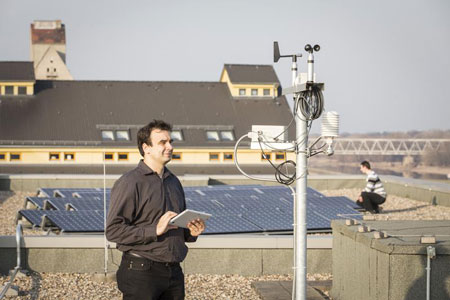| Mar 20, 2014 |
Renewable energies: Smartly controlled infrastructures neutralize fluctuating availability
|
|
(Nanowerk News) More and more frequently, companies are generating part of their electricity themselves in order to cut costs. As far as possible, the energy is supposed to come from renewable sources– whether from a biomass-fired power plant, a solar complex or a wind turbine. Unfortunately, they are not always available. Researchers from the Fraunhofer IFF in Magdeburg have developed a novel, dynamic management system that compensates for their volatility. The researchers will be presenting their solution for small and medium-sized enterprises at Booth C10 in Hall 13 at Hannover Messe (April 7-11).
|
 |
| Integrated in building master control equipment, the energy management system will make it possible in the future to control power consumption in companies efficiently. (Picture: Dirk Mahler / Fraunhofer IFF)
|
|
The electrical grid must be stable and always available. Researchers from the Fraunhofer Institute for Factory Operation and Automation IFF intend to make infrastructures, e.g. in a complex of buildings, a factory or even an entire industrial park, smarter and thus compensate for the volatility of renewable energies. A building or complex will be heated and climate controlled and other power consumption will be covered as soon as energy from renewable sources can be used. Internal storage systems will be charged and adjusted to consumption. If renewable energies are “slack”, though, the stored power will be used. The “DynEnerMan” energy management system responds when a company is expecting maximum demand, for instance, for a high-energy manufacturing order.
|
|
To facilitate fully automatic operation, the amount of energy required and the amount of power expected to be produced on such a day are measured first for rough planning. In detailed planning, the data for the next fifteen minutes are supplied. The researchers use neural networks trained specifically for the particular complex infrastructure to make forecasts. The system uses the forecast to optimize energy use for the next quarter hour automatically.
|
|
The energy management system is intended to be ready for the market next year. Integrated in building master control equipment, it will make it possible in the future to control power consumption in larger complexes of buildings and production facilities efficiently and continuously according to environmental or economic criteria. “The system constantly makes the best out of the current situation and boosts energy efficiency. This will enable companies to control their energy costs better and to protect the environment,” promises Dr Przemyslaw Komarnicki, a researcher at the Fraunhofer IFF in Magdeburg.
|

